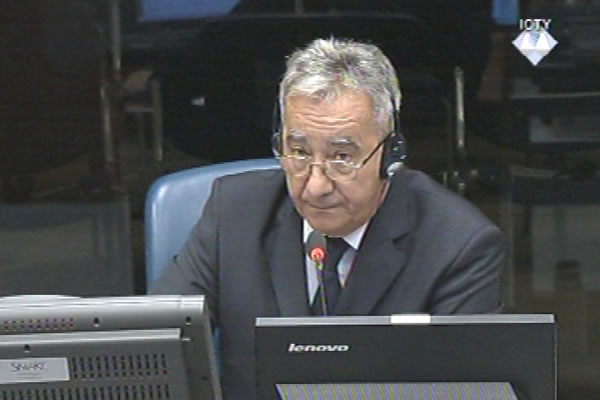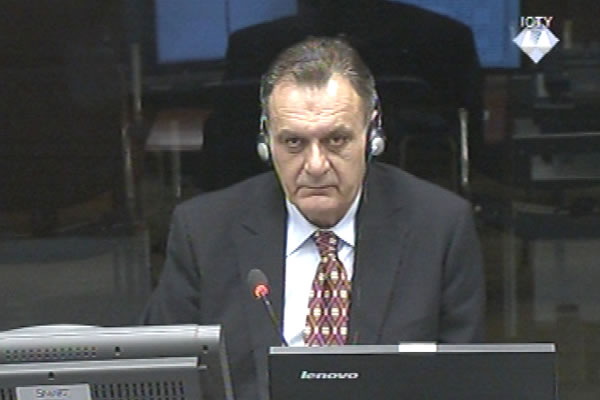Home
WAR STORIES FROM FOCA HOSPITAL
Veljko Maric, a medical doctor and war-time director of the Foca Hospital, has claimed that the hospital didn’t discriminate against people on the basis of their ethnicity. He also claimed that Muslims left the municipality voluntarily. The prosecutor noted that civilians: women, children, the elderly, and indeed some of the witness’s colleagues, were detained, abused and killed. Civilians were thus forced to abandon their homes, the prosecutor stressed
 Veljko Maric, defence witness at Rako Mladic trial
Veljko Maric, defence witness at Rako Mladic trial During the war, Dr. Veljko Maric worked as a surgeon. In 1993, he was appointed the director of the Foca Hospital. Today, in his evidence in Ratko Mladic’s defense, Maric claimed that all patients, regardless of their ethnicity, were treated in the hospital. The witness's argument was to convince the Trial Chamber that the Muslims didn’t leave Foca because of discrimination and pressure. On the contrary, according to Maric, the Muslims fled because they feared for their safety. Serbs shared their fears.
According to Dr. Maric’s, from April to the end of 1992 more than 1,900 patients were treated in the hospital. This figure included 300 Muslims: the wounded, the detainees from the Correctional and Penal Facility (KPD) in Foca who needed medical treatment, and a group of children who were left homeless but were otherwise healthy. After several months in the hospital, the children were sent to Igalo, a summer resort in Montenegro, and were later reunited with their families, Maric explained.
In the cross-examination, prosecutor Grace Harbour presented various lists showing that there were Muslim women, children and elderly with gunshot wounds among the hospital patients. In his statement to the defense, Maric claimed that the conflict ‘forced people to go where other members of their ethnic community lived’. The prosecutor put it to the witness that the attacks in which Muslim civilians were wounded in fact caused them to flee Foca. Maric agreed with the suggestion. However, the witness recalled that there were also Serb victims. During the war a total of 2,500 Serb civilians and soldiers were treated in the hospital, the witness stressed.
In his statement to the defense, Maric said that by mid-July 1992 Muslim doctors had left the hospital of their own free will, ‘not because someone had expelled them’. This prompted the prosecutor to remind the witness that Foca Hospital doctors like Amir Berberkic, Aziz Torlak and many doctors from health care centers had been detained in the Correctional and Penal Facility (KPD) in Foca. They suffered the same fate as the other detainees: they were beaten and tortured. Dr. Torlak died there. Maric agreed that his colleagues had been detained in the KPD Foca, but both Serbs and Muslims were in fear for their safety. ‘Were Serb doctors detained in the KPD?’, asked Judge Moloto. The witness replied that they were not.
Invoking a part of Maric’s statement about the Muslim children who were put up in the hospital, the prosecutor stressed that those were boys and girls whose parents had been killed and whose homes had been destroyed. That was why the children didn’t have a place to stay. Also, the prosecutor mentioned several examples, such as seven-year old Selma Tafro and her eight-year old brother Jasko, whose fate was described in a newspaper article: Serb soldiers headed by Janko Janjic Tuta broke into the children’s home, raped their mother and killed both her and her husband in front of the children.
Dr. Maric said that at the time he didn’t know who had been brought to the hospital and for what reason. In Maric’s view, that was in fact ‘a beautiful thing’. The hospital accepted the children although they were not ill and despite the fact that the primary function of a medical institution was to take care of the sick, not of the healthy people.
After Maric completed his evidence, the defense called Mane Djuric, former chief of the Vlasenica police. Djuric claimed that Muslims from Vlasenica had left the municipality voluntarily in fear of revenge and out of concerns for their personal safety. In Djuric’s view, Susica was not a prison camp but a ‘collection center for persons seeking safe accommodation’. The witness confirmed that he had heard about Dragan Nikolic Jenki's guilty plea at the Tribunal for crimes against prisoners in Susica. Djuric explained that Jenki was a police officer who was later transferred to the Bosnian Serb army. Neither Jenki nor any other Serb from Vlasenica has ever been tried before domestic courts for crimes againstMuslims, the witness conceded.
Ratko Mladic's trial continues on Monday.
Photos
Linked Reports
- Case : Mladic
- 2014-10-29 MLADIC’S WITNESS: ‘NO ONE STARVED TO DEATH IN WAR IN BH’
- 2014-10-28 LETING HUMANITARIAN CONVOYS THROUGH
- 2014-10-27 WAR-TIME ASSISTANT DEFENDS MLADIC
- 2014-11-03 CIVILIANS WARNED TO KEEP AWAY AS VLASENICA MOSQUE WAS BLOWN UP
- 2014-11-04 SERBS SECEDED FROM BH BECAUSE THEY WERE ‘HUMILIATED AND OUTVOTED’
- 2014-11-05 WITNESS KNOWS NOTHING ABOUT CRIMES OF HIS FELLOW FIGHTERS

